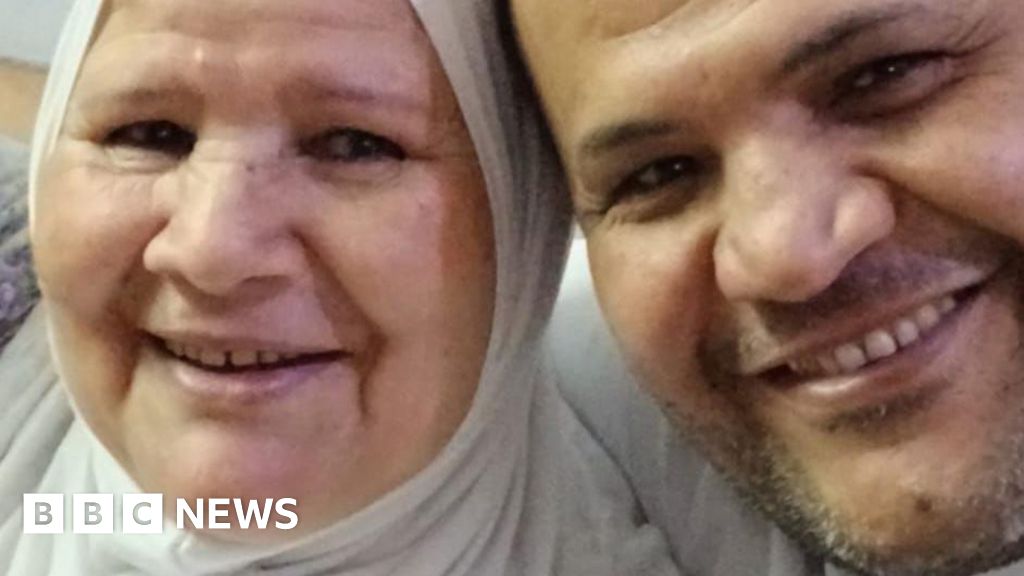World
Hajj heat deaths: Egyptian pilgrims ‘totally abandoned’ – BBC News

- Author, Sally Nabil
- Role, BBC Arabic
- Reporting from Egypt
Hundreds of people are thought to have died amid soaring temperatures at the Hajj pilgrimage in Saudi Arabia. Those who have perished come from more than two dozen countries, with most fatalities from Egypt. The BBC visited one community there which has lost more than 20 people.
Many Egyptian pilgrims come from poor villages. They spend their life savings on the spiritual journey to the holiest city in Islam.
Effendiya, a 70-year-old mother of five from the northern province of Menoufiya, sold her jewellery to pay for her trip, her youngest son Sayyed tells me, but died while performing her rituals.
“My mum’s death has broken me,” he says, bursting into tears. He explains that going to Hajj was his mother’s biggest dream.
Effendiya, a widow, went to Mecca on a tourist visa, not on an official Hajj visa.
She was among hundreds of thousands of unregistered pilgrims who hoped to fulfil their religious obligation this year without obtaining special Hajj permits.
Saudi authorities considered these unofficial visits a violation of their regulations. But the process of obtaining official Hajj permits can sometimes become costly or complicated.
‘She couldn’t take the baking heat’
Getting on an official Hajj convoy in Egypt – a country in a deep economic crisis – can cost around $6,000 (£4,700) per person.
Effendiya’s trip was organised by a local broker, who charged her half this amount but promised her five-star service, her family say.
The reality was totally different, they say.
On Arafat Day, this year falling on 15 June, pilgrims spend from sunrise to sunset congregating on Mount Arafat – around 20km [12 miles] from Mecca – for prayers and sermons.
“The bus dropped them around 12km away from Mount Arafat and left. She had to walk all the way on foot,” says Tariq, Effendiya’s eldest son.
“Whenever I video called her she was pouring water on her head. She couldn’t take the baking heat.
“In our last call she looked exhausted.”
Pilgrims usually stay in air-conditioned tents, have buses to drive them between holy sites and are provided with medical care.
Sayyed says Effendiya and other unregistered pilgrims “had none of these facilities, they were totally abandoned”. He adds that they tried to protect themselves from the searing heat by using bedsheets to make a tent.
Her family say they have been unable to contact the broker who organised her trip.
Hajj is one of the main pillars of Islam. Muslims are required to take part in it once in their life – if financially and physically capable – and believe they come back from the pilgrimage cleansed of their sins.
It’s one of the largest annual religious gatherings in the world. Nearly two million pilgrims have travelled to Mecca this year.
But none will have set out expecting their journey to end with their demise.
‘I just wished I was with her’
The Egyptian authorities say many of the deceased pilgrims are not registered, making determining an official death toll difficult. The foreign ministry has said it will take more time and effort to identify the dead and contact their families.
Egyptian Prime Minister Mostafa Madbouly has said an investigation will be opened into the activities of all tour companies involved in sending unregistered pilgrim to Saudi Arabia.
“Without my mum, I feel scared,” says Manal, Effendiya’s eldest daughter, eyes full of grief.
She recalls that she started screaming the moment she received the news of her mother’s death.
“Shortly before she died, she called my brother and told him that she felt her soul was leaving her body. I just wished I could have been with her then,” Manal tells me, tears rolling down her cheeks.
Effendiya died while lying down to catch her breath in the shade on a street corner.
Her heartbroken children take some solace in the fact that she was buried in Mecca.
“She was hoping to die and be buried in the holy city,” Manal says.







:max_bytes(150000):strip_icc()/roundup-writereditor-loved-deals-tout-f5de51f85de145b2b1eb99cdb7b6cb84.jpg)


